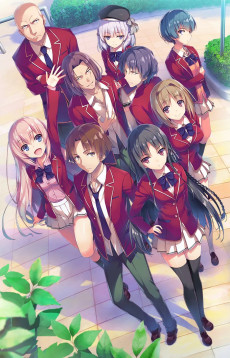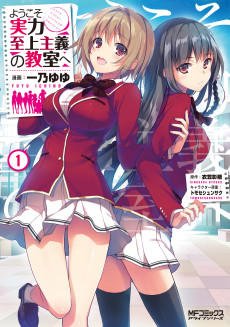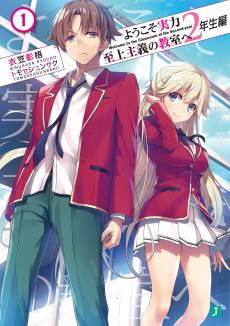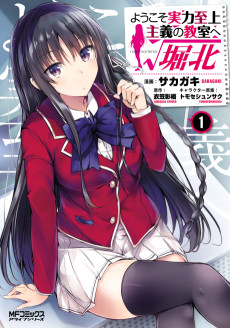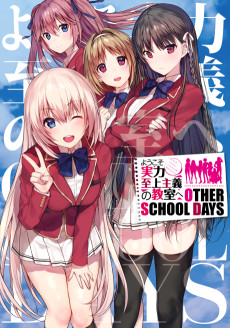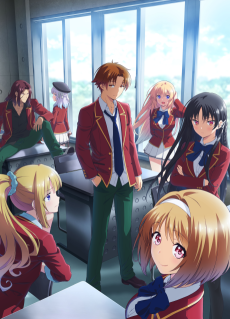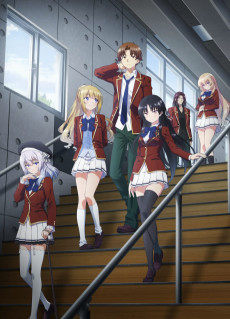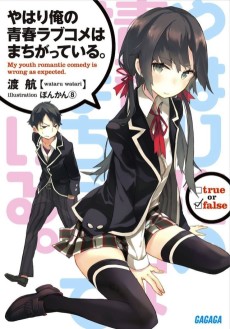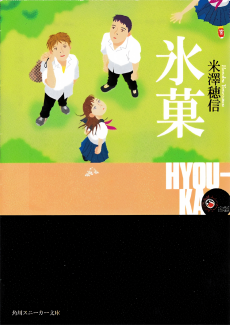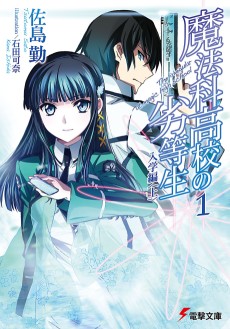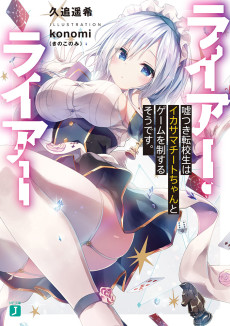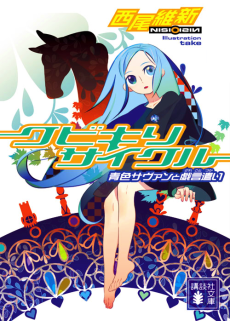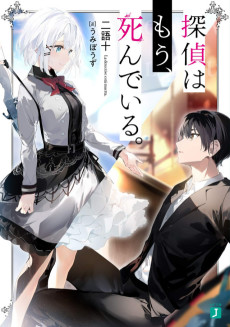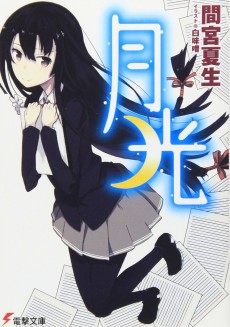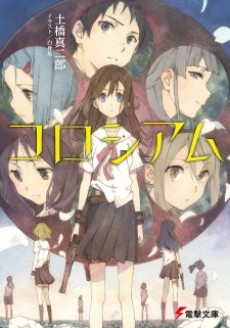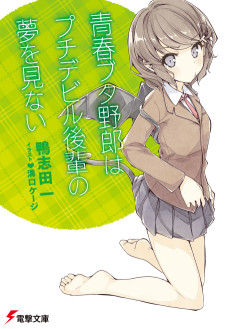YOUKOSO JITSURYOKU SHIJOU SHUGI NO KYOUSHITSU E
STATUS
COMPLETE
VOLUMES
14
RELEASE
September 25, 2019
CHAPTERS
110
DESCRIPTION
Students of the prestigious Tokyo Metropolitan Advanced Nurturing High School are given remarkable freedom—if they can win, barter, or save enough points to work their way up the ranks! Ayanokoji Kiyotaka has landed at the bottom in the scorned Class D, where he meets Horikita Suzune, who’s determined to rise up the ladder to Class A. Can they beat the system in a school where cutthroat competition is the name of the game?
(Source: Seven Seas Entertainment)
Includes Volumes: 4.5, 7.5, 11.5
Included Chapters: 14 Prologues, 13 Epilogues, 1 Extra
CAST
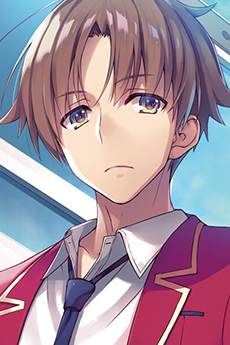
Kiyotaka Ayanokouji
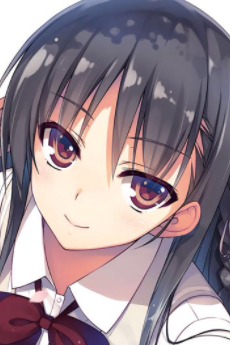
Suzune Horikita
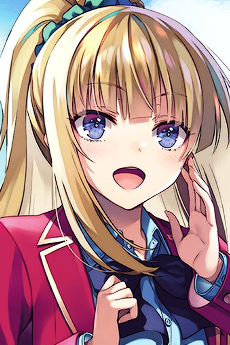
Kei Karuizawa
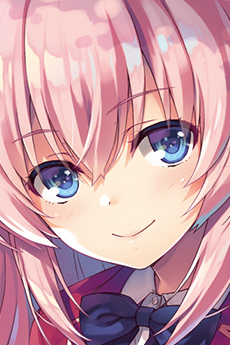
Honami Ichinose
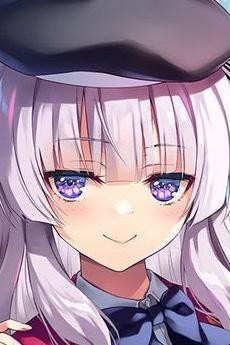
Arisu Sakayanagi
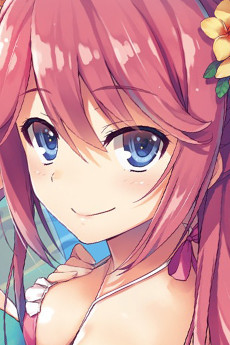
Airi Sakura
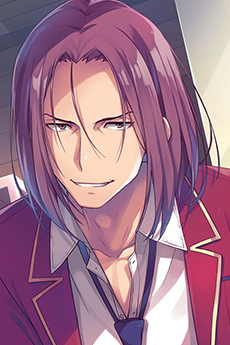
Kakeru Ryuuen
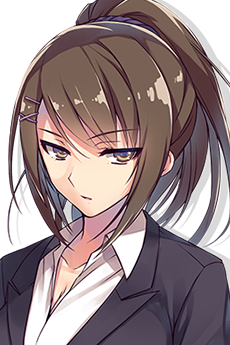
Sae Chabashira
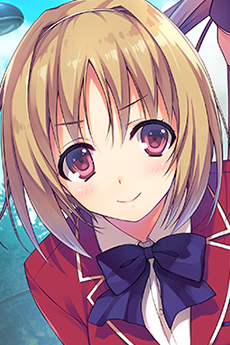
Kikyou Kushida
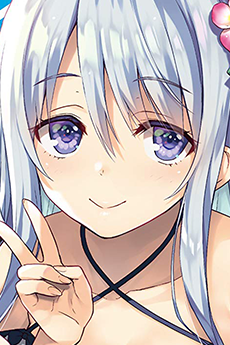
Hiyori Shiina
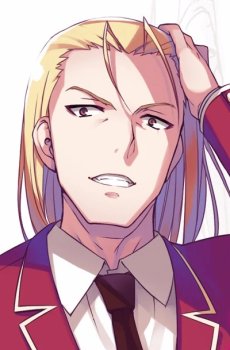
Rokusuke Kouenji
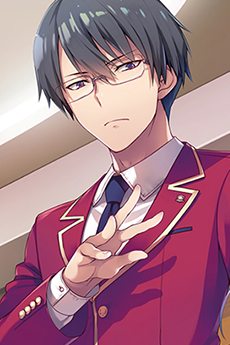
Manabu Horikita
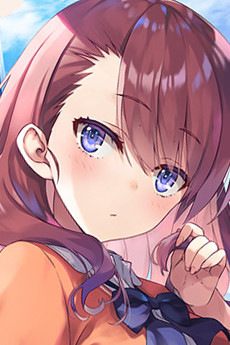
Maya Satou
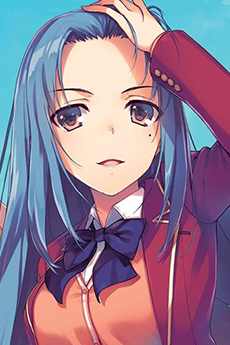
Haruka Hasebe
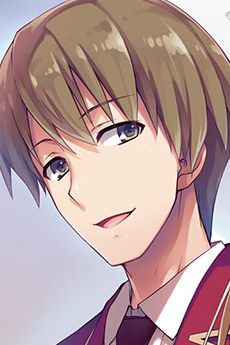
Yousuke Hirata
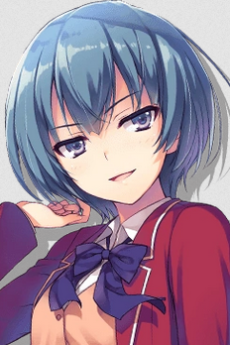
Mio Ibuki
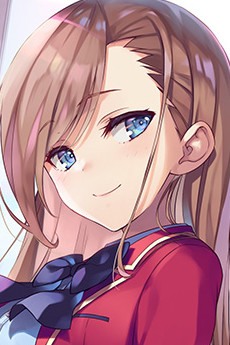
Chiaki Matsushita
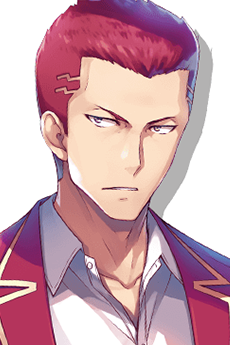
Ken Sudou
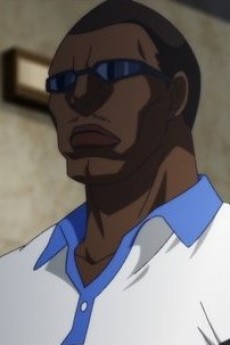
Albert Yamada
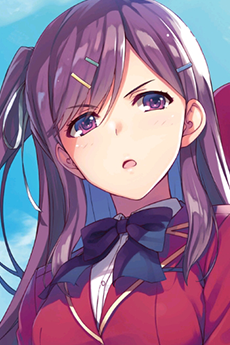
Masumi Kamuro
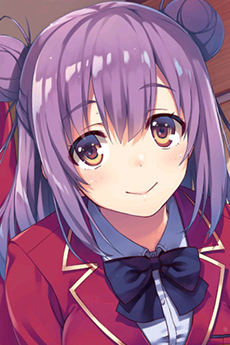
Akane Tachibana
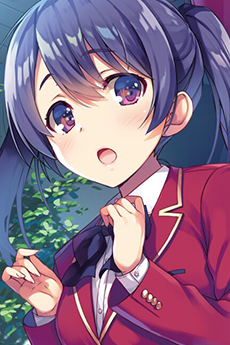
Mei-Yu Wang

Chie Hoshinomiya
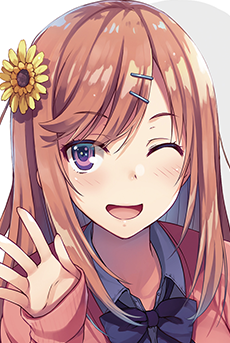
Nazuna Asahina
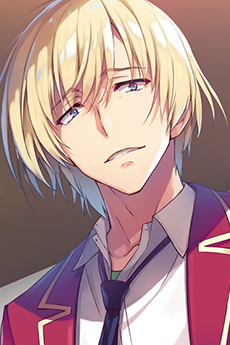
Miyabi Nagumo
CHAPTERS
RELATED TO YOUKOSO JITSURYOKU SHIJOU SHUGI NO KYOUSHITSU E
REVIEWS

KaizokuOtaku
92/100Journey of acceptance, humanizing, growth, love with a big colorful cast, top-notch waifu designs. A total gem packageContinue on AniListI've always wished for a story that paints school life in a more realistic take. Everything from all the hurdles you'll go through, such as adapting from zero to making friends, forming groups. Experiencing love-life, the sweetness it brings, and the bitterness it might lead to, and the list goes on. You-Zitsu (Classroom of the Elite) is just that. However, there is one big exception: our main protagonist is surrounded by females from every corner. It's not a harem by any means, but it does have a trace of it. Nevertheless, sweet and sugar is just what sells best and looks good on paper. Seeing a lovely female on the cover is a strong tactic to bait the audience, and it works so damn well. It caught me after all and many of my fellow readers, I am sure. I ended up staying for far more than that. It's been a roller-coaster of an emotional ride, making me laugh and cry, feel pain, get enraged, and so much more. Oh, did I forgot to mention despite seeming like it takes place in a school. It's far more than that.
You-Zitsu is a strong character-driven story. Shougo clarifies how the characters think and shows it in a detailed manner, delving deep into the psyche and fleshing them out without cutting corners. Growth is done tastefully and at a realistic pace, not too quick, not too fast. One of the key components of growth: self-reflecting, and overcoming hurdles or issues of the characters is shown clearly before moving to the next step. Before all of that, the person you are introduced to might come off as generic, cliche, or too simple. It could be a guy that gets all the girls and is popular in the class—someone who makes everyone smile and feel warm and fuzzy inside and more. The thing is, the outer exterior is covering a more profound secret, filled with issues, difficulties, and other sorts of problems. You-Zitsu takes its time exploring each and every layer, so once all comes full circle. You'll grow such a strong emotional bond with the character that can not be bend or broken easily as before anymore. You-Zitsu shows how we humans are swift and flexible species that can turn from harmless animal to a vicious wild carnivore at the drop of a hat. It shows, among others, how we desperately protect our secrets, things we don't want others to find out.
The setting takes place in an environment where the students are forced to work together or fail together. If a single student does their own thing, not caring for their classmates. That will ultimately affect the whole class. It's needed to put at least the bare minimum of effort to work together and pass. The competitive environment is heavy and exhausting as every student gets placed in anything other than class A. They are competing against each other to take the first spot and undermine the other classes, totally crush them. While the current Class A is doing everything in its power to defend itself against incoming attacks. It's worth noting that each class has its own hierarchy they use to move forward. A brutal and vicious tyrant, an angel that takes on everyone's worries and sorrows, a smug queen that uses its student as chess pieces. Maybe even a class that has more leaders or several factions with their own ways to do things.
During the intense pressure, the students hiding behind a facade might be forcefully revealed if they don't manage to guard it. This further gives them room to reflect on themselves, learn, and gain experience by interacting and discussing with their fellow classmates. Advanced Nurturing High, the place where the story takes place, is unlike other schools. It's ruthless, vicious cause students easily get expelled, no one is safe, bizarre as the exam and test have unconventional practice that will boggle your mind. Heavenly and pleasant since students can buy everything with the points they can use on campus, but there is a big and dangerous catch. Besides, the school has one huge center, filled with shops, cafes, barbers, and other places to fill the student's daily needs.
Shougo is unlike the most Author you see nowadays, and his creativity is both brilliant and unique. His unusual approach with characters, heavily reliant on how humans behave and thinks. It takes a lot of courage, skill, and understanding to execute this complex and ambiguous writing. He intentionally misleads the readers just to suddenly surprise us on the next turn. But this style might be a double-edged sword that could make the story dull and tedious if not done with a heart and taking decisive actions. Shougo does not disappoint one bit. With the story so slow-paced, it makes sense. I wanna note that no volumes of You-Zitsu should be skipped. Read the .5 volumes as they are essential to the main plot. It both sets up the groundwork for the future. It gives you a different perspective on characters—something to really solidify your bond and appreciation for them. It's not limited to the main character, someone you didn't get to see much of in the whole numbered volumes might get more time to shine here. One more thing is that You-Zitsu is genuinely slow, and the first 3 volumes act as a prologue, so read 4 volumes before making any rash decisions. That's the point I was, without a shadow of a doubt, hooked.
I've never seen or read a romance development that felt more realistic than You-Zitsu. Mind you, it's not the core genre either. Love simply doesn't come out of nowhere. It's not the typical boy fall in love with a girl just because he is cool or she is cute. No. Hell, feelings of love itself don't even exist at first. At some point in the story, there comes a situation that gets the two parties together for whatever reason it might be. But at this point, they will only be acquainted, might really come to hate or loathe each other, but they are aware of each other's existence at the very least. Then one step at a time, they grow closer as they experience all kinds of difficulties and interact with each other. This goes on to deliver one of the most impressive, complex, charming, and realistic paintings of romance I have ever come across in fiction. You-Zitsu does this and much else with brilliance and a clear sense of direction, as noted. Everything is cohesive and fits together, there are times I have been confused, but things always make sense when the Author wants us to not feel like dorks anymore.
What is You-Zitsu really about? It's about self-acceptance and maturity. We follow the journey of many, but at the core, there is the dull loner Ayankokouji Kiyotaka who likes to spend time alone rather than with others. However, that's only on the surface-level as Kiyotaka is hiding a lot of things about him. It's too hard to talk about this man without going into spoilers. So let's just leave it at that he is one of my all-time favorite character. Oh, let me also tell you this and more that he is one of the biggest reasons You-Zitsu is a blast. His growth throughout the first part of You-Zitsu is so damn satisfying, rewarding, and worthwhile. He is an extremely well-written protagonist with tons of layers to himself. To put it in a nutshell, You-Zitsu is a thrilling journey about humanizing Kiytoaka from his current self to someone who can ease into society and express genuine emotions.
Did I forget to mention that You-Zitsu has an incredible illustrator? Not only are the volume cover always eye-catching. Shunsaku Tomose's art-work is seriously stunning, especially those detailed colored illustrations he makes. He is continuously improving from volume to volume, and the illustrations are slowly increasing per volume. But I know what you are after, and I am here to confirm that females are voluptuously well-drawn. Many got plump and savory thighs and a drop-dead gorgeous design. Expect to see all kinds of variations of them. Ranging from an adorable big-brained smug queen with some insanely addictive facial expressions. A two-faced thot with some brain damage and serious issues she has to work out. One charming ice-cold princess that grows warmer as we progress. A waifu that spreads burst of sunshine wherever she threads and a got a very energetic and lively personality: a gyaru that is ineffably adorable and an absolute cinnamon roll. She got the right amount of tsundere and sweet with a refreshing and realistic nature. We even got one of those shy cuties that ooze of pure must protect energy. Did I mention we got an explosive tomboy tsundere with one hell of an impressive kick and sharp tongue? The list goes on.
Do you need any other reason to read You-Zitsu, then it's for the female that is not only candy for the eyes but well-written, fleshed out, and developed. No one feels like a cheap imitation of the other, and they all got clear and distinct quirks. I won't lie. That's partly why I picked up You-Zitsu, but it sure shattered my expectations both the male and female and how they are tackled. The Author, Shougo Kinugasa, is seriously no question asked one of the most ingenious writers I have come across. I cannot stress that enough. This is a masterpiece. I can see the most prominent issue being the pacing or how, at times, Shougo tends to repeat himself. It also felt a bit abrupt when jumping to places at times. This is merely a nitpick. I doubt many would notice unless you read the novel more than once or are very picky. Plus, Shougo clearly got better at writing and explaining, and the pacing felt even better. As of this moment, You-Zitsu is split into two parts depicting the first year and the second year. The latter is only getting started, but so much excitement has already been built up events foreshadowed, so it's gonna be a banger, no doubt. It also seems like the excellent waifus design with a complex personality will keep on piling. And you know what, I so damn wholeheartedly welcome it.
Let's say you are an Anime or a Manga fan. What should you go with, you ask? Manga has not got the best art. It cuts stuff out and burns through content fast, and Kiyotaka's depiction is nothing like the novels. It ruins his character and possibly the experience of You-Zitsu. If you've read the novels, I felt the manga was a good way to visually see how the events might be depicted if you could see it. But it's not a recommended way to get into the novels. Then there's the anime, which is lackluster and feels more like an advertisement for the light novel. Not to mention, the director was biased and gave all the spotlight to his favored female. When in actual fact, many other females should've had a moment to shine. On top, the art-syle is inconsistent, it looks good at times, but more often than not, it's derpy. If you want the finer details and true depiction as the Author intended. The light novel is the best way to go. As a whole, You-Zitsu is about the students' everyday school-life as they mature into adulthood. I can almost guarantee you might end up falling in love if you really give it a chance. Don't rush it. Just read it at your own pace. The translations that are out are pretty good, making it smooth to read and easy to visualize as you burn through the content. I didn't feel it was overwhelming or grew dull. I was reading one volume after the other quite effortlessly and having a big blast about it. This is easily no question asked, taking a spot in my favorite, and it got my absolute seal of approval.

Jaekoi
97/100An introspective pilgrimage into the vast unknown.Continue on AniList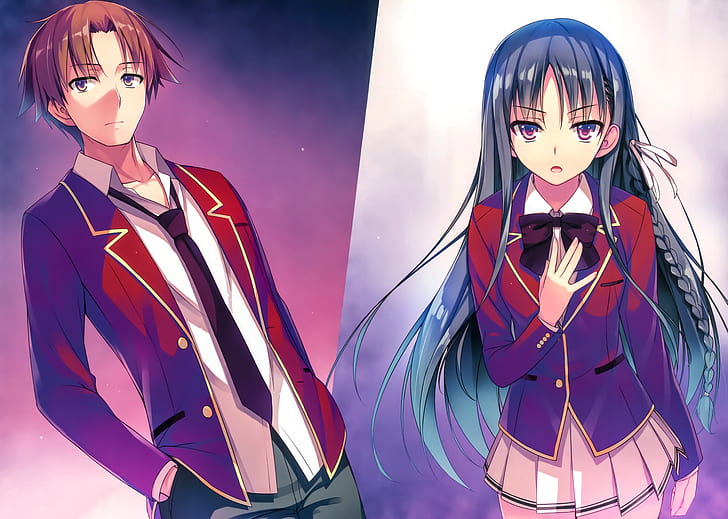
I’ve always had a love-hate relationship with certain works functioning in the school setting. Though it isn’t mainly due to the lack of realism and encompassing narrative structure, more so the shortages of authenticity and innovation that isn't ostentatious. There’s nothing inherently bad with repeated tropes, gimmicks, and punchlines fused with school functionalities, but after a while, things start to go vaguely downhill when authors don’t make use of implementing fresh ideas, or simply avoiding any risks with new cards. Especially since the concept can be deconstructed/reconstructed in a variety of ways considering our youthful society is well-versed in academics, athletics, societal environments, education, and adolescence in general. In a way, it's become a way of life. Within this conceptualization, the possibilities are insurmountable. Potential ideas and formulas also come into play and can make up for some octane entertainment value. So, it’s rather saddening to see many works not willing to venture in broadening their horizons within the unknown.
Although, in Shougo Kinugasa’s Classroom of the Elite, the term ‘school’ is given an innovative meaning, essentially a veritable formula that breathes new life into the concept’s shortcomings. Additionally, as the story voyages into the characters themselves, Classroom of the Elite becomes something much more than a 'school’ tale. With a plot-heavy foundation, several classes consisting of A-D, separated by a hierarchy-driven system, are continuously scrimmaging for the desired throne of class A. With a metropolitan high school, a non-stop battlefield is fought by distinctive individuals through examinations given by the school itself. The opportunities of victory and the risk of failure are set in stone inside the students themselves. And with the ever-so changing character perspectives that are filled with colorful diversity, unpredictability becomes a leading product of Classroom of the Elite's general nature.
In terminology of the characters themselves, the words presented to the reader are a reflection of their thoughts, decisions, and ideologies. The amount of depth and substance ingrained in each person's psyche righteously works well with the narrative simply because of how each individual interacts with one another. The relationships, dynamics, contracts, and connections formed by enemies, allies, and neutrals has given me incredible immersion and curiosity into what’ll occur next. The stakes of sinking to rock-bottom and the joy of monumental growth is simply breathtaking. Confrontations, whether combatively physical or introspectively psychological, are given justified placements. In other words, psychological warfare and tactical strategy planning are the main dish of character motives. Though most impertinently here, Classroom of the Elite is a feasible “coming of age” tale that privileges its narrative with truthful realism. I’d rather not spoil the contents of what this masterful story has to offer but for quick insight, the ranging cast of characters feel humanized in all the right ways due to how each individual struggles with uncertainty and hardship.
Ryuen’s Class C showcases tyrannical authoritarianism as an embodiment of who he is, and how he functions as a deceptive snake-like creature. Ichinose’s Class B is a believable representation of steel-borne unity as a sign of synergism and caring leadership. Sakayanagi and Katsuragi’s Class A influences a divided, factional, orchestration of pure talent with sprinkles of puppeteering and manipulation. Ayanokouji and Horikita’s Class D sits at the short end of the stick naturally, essentially at odds of sitting at rock-bottom, but through time, there seems to be hints of valuable growth within several individuals because of certain occurrences. Additionally, with a mastermind in the depths of the shadows, manipulation and strategic thinking play a vital part in their successes and failures.
On the surface level, some characters may seem to be outlines of generic, carbon-copied mannequins pasted from other works. There’s branded clicks determined by popularity and status, and even the romanticism may come off as cliche... but not to the point of being off-putting. Things start to become nuanced each volume, which is occasionally hinted beforehand through Ayanokouji and character monologuing. Within its core, Classroom of the Elite becomes a cavernous exploration of human psychology through showcasing the deepest secrets of each individual. Motivations, sought-after dreams, and goals followed by actions, decision-making, and framework start to become meaningful because of overarching circumstances. The humanization of several characters through presenting credible, convincing problems and issues within their backstories concerning delicate topics are a manifestation of what makes a “coming of age” tale appealing. And while the constant, regurgitated limelight surrounding the inner thoughts of these individuals may seem repetitive at times, the merciless payoffs of each arc make the experience much more rewarding.
For more insight, Classroom of the Elite's first 3 volumes act solely as a prologue, and the .5 volumes are heavily significant in giving the reader background knowledge in orienting character identities and further insight into each compelling mystery within the school. Moreover, It's relatively moderate in pacing, as seen through its steady buildups of each arc, meaning it may take some time to be familiarized with, especially as it is a light novel.
In relation, there’s a balanced amount of variables within the complexion of its narrative flow and encompassment. While society’s management with schooling tends to lean on independence of one’s success, Classroom of the Elite is the opposite with forcing its idea of the ‘S’ system and ‘Class Points’ System upon the students, motioning towards the significance of teamwork and dependence in order for victory. And with an unforgiving layout akin to this, the stakes, risks, and significance of each arc simply becomes mountainous.
Additionally, because of these implementations, character notability, standing, and eminence steadily increases as time moves forward, creating Classroom of the Elite’s investment factor and privileging the reader with a sense of responsiveness to the characters themselves. At first sight, the characters may seem one-dimensional, but with patient, methodical writing direction, things eventually become multi-layered.
Homogenous to Netero’s renowned quote, “Human potential for evolution is limitless.”, Classroom of the Elite’s thematic nosedives into an enterprise of maturity and growth, not only that, but it invokes the unrealized capabilities of what humans can become through appropriate maturity and heightening of each individual’s aptitude. Principally, It's a dormant flair patiently waiting to be resurrected back to life. Horikita Suzune, along with several others, is an incarnation of this fundamental regarding their noticeable improvements in self-identity because of the school’s “examinations”, personal relationships with others, and discernment. Because of this, the concept of self-reflection is enhanced to its fullest potential, being able to create natural poignance. Within each chapter, most characters are constantly putting up a facade, clouding their inner identities, motivations, and biography, which if done properly, can formulate misleading outcomes that one would not expect.
With sharp dialogue that details upon a multitude of personas, the extent of Shougo’s aims has no boundaries whatsoever, especially in terms of fleshing out its ranging cast. Many modernized stories tend to have incoherent dialogue, ending in major fallacies with stemming the intended atmosphere, but in Classroom of the Elite’s case, the amount of relentless, pressuring, yet connate dialogue is a sight to behold. Not merely within the realms of characterization, but in leaving a profound message by the end. From mere words in a light novel, the descriptive usage of wording is given priority. And with this, picturing scenarios aren't tedious, instead, they're addictively engaging, without any need of enforcement.
The terms, “creativity” and “impact”, are a fundamental, underlying basis used to illustrate this odyssey. With the bizarre systematics within the school itself through usages of forcing the classes to establish alliances, or to uncharitably pressure them into conquering one another during the exams, is a prime example of setting unrivaled entertainment value for predetermined success.
Introspection is something Classroom of the Elite embraces without any strings attached. With all the characters having to face hindrances, whether it’d be about past traumatization, recent impediments, or future distresses, the story itself is simply a pilgrimage of growth exploring the weight and struggles of human potential, conveying how imperfection stems enlightenment. More notably, Classroom of the Elite centers around multiple forms of growth. While the concept itself is rather vague without context, this is something the story emphasizes on with care, expressively recognizing itself as a brilliant ode. Some characters come to understand that change is naturally an arduous process, others have difficulty in managing themselves, and many unfortunately fall victim to dilemma. Respectively, I guess this is ironically similar to many problems residing within innumerable students, such as myself, throughout high school to college. But most notably here, since time doesn’t wait for the average person, there comes a moment when maturity introduces itself, whether the intended occasion is sentient or not. And regardless of what difficulties people are met with, what reputation they’ve produced in youth, or whatever the current situation is, one should know there exists an opportunity for redemption and growth atop the peak of misfortune.

Nagumo
100/100Perfection of PsychologicalContinue on AniList[Spoilers] Koudo Ikusei Senior High School is a leading school with state-of-the-art facilities. Its purpose is to nurture the people who’ll lead Japan in the future. The students have their freedom, but contact with the outside world is forbidden during the three years, setting up an environment for nurturing its students. The classes compete against each other to graduate from Class A, being the only class that is promised recommendations for future jobs, universities, etc. Competition happens through “special exams” where the classes outwit each other to win and earn class points, but happens in their daily school lives, likewise. The classes are rated after their standings in the class points ranking, and class points are subtracted from poor behavior during classes. Classroom of The Elite refreshes the school genre, creating its entirely own school system, which is well-thought-out. In the afterword of V1, the author commented he thought academics were not everything, but decision-making, sports, etc, were just as important, after school. Normally, the school setting is thoroughly focused on academics, and who ranks highest grade-wise. Students slowly improve over time and fix their individual problems, as the school sets up an environment perfectly suited for them, which makes for excellent character development, especially from the POV of Class D, where students have defects/problems, for example personally traits (stubborn, hot-tempered, etc.)
Rigidly stated throughout the series is that the school is a full-fledged meritocracy, which is and is another refreshment of the genre. The classes and students don’t go from zero to a hundred within mere weeks or months. Everybody gradually improves midst the special exam and faces problems before climbing the ladder of class ranks. They don’t suddenly increase from Class D to A without actual improvement of its students or teamwork. In a meritocracy, those without abilities fall and those with abilities rise as seen here with Class A gaining over a hundred thousand points per month because of their abilities and are guaranteed higher education if they graduate from Class A. The school is per no se a full-fledged meritocracy as made out, and this topic gets a nudge as Nagumo makes a declaration of a revolution coming, and is the ideological fight between him and Manabu. The traditionalist versus the reformist.
Throughout the school year, classes compete in special exams, which test the students' thinking, academics, physical, decision-making abilities, etc. As well as the leadership of each class, will they be able to win against the others, outwit them, and come up with the right strategy? Classroom of The Elite perfectly executes this. I’ve always wanted something that executes mind games correctly. Something with constant plot twists that leaves you craving for more. Something that depicts mind-games in a well-fashioned manner. Classroom of The Elite does everything perfectly. During special exams, classes are set up against each other, fighting against each other, scheming against each other. In order to win, the students need to outsmart their opponents.
Sure, there are special exams where you cannot outsmart anyone, but the novel does a great job at making sure that there is always something interesting and mysterious. There are of course also special exams, where classes are teamed up against each other, but that does not equal that they'll work together because, in the end, the classes are always fighting against each other.
The main character is Ayanokouji, who fled from the white room to live a peaceful life. Ayanokouji is described as the perfect human being, having learned more than a normal human being would ever learn in their life span. He outranks all the other students by miles and never loses to others, always seeing through them. But he's completely devoid of authentic emotions, things that a normal human-being experiences in their life. He has experienced none of these things. Sure, he shows emotions here and there, but he has a complete poker face and those emotions are more of a self-mechanism tool. He has no sense of morality or ethics, whatsoever. Never having experienced any of these things, a normal human being would, but through the story, he experiences "these things" and starts changing.
From the start, he just wishes to have three peaceful high-school years, but that contradicts his actions. He scored 50 points on every subject in the entrance exams, which is harder than scoring full points. His character is contradictory, he is an unreliable narrator. Not only does he lie to us, but to himself, and that's what makes him such a prominent character to me. He keeps doing this, not knowing what he will do in the future. He has his fake persona, the one he puts on in front of his classmates and what you'd call the "ordinary student" who scores average academically, as well as in sports. He's completely ordinary and doesn't stand out amongst the students as someone superior. And then there is his white-room persona, his competitive self, who never will accept a loss and does everything in his power to win. The story is not only about Class D reaching Class A, nor the students maturing, one by one. It is also about Ayanokouji's conflicting self, discovering what he wishes for, and confronting his past.
The story felt repetitive in earlier parts, especially with the exams, but as the story progresses. The punishment gets harsher, but the rewards get higher. Nagumo gets introduced, highlighting the meritocracy, and making the special exams much more intriguing. Each exam explores new things, backstories, conclusions of previous events, redemption, etc. An exam is not just an exam, where they go head to head, but it plays a part in the characters, as well as their daily lives.
Classroom of The Elite has well-written side characters and explores different ideologies through the different classes. Each class has a different ideology and the story cleverly explores each one. You have Class C, controlled by Ryuuen, showcasing tyranny. Ryuuen doesn’t care if someone within his class gets hurt. He does everything in his power to win special exams and his character is from time to time, what makes the story interesting. You never know what’ll happen, but there’s one thing that’s certain and that is that something will always unfold. There will always be scheming. In special exams, where you'd expect nothing major to happen, Ryuuen strikes and creates tense situations.
There’s Class B with Ichinose, who’ll help everyone and doesn’t want anyone from their class expelled. The polar opposite of Class C and Ryuuen. They don’t believe using violence to win is the right choice like Ryuuen. Their morals are explored through special exams, where they have to make tough decisions and expulsion is likely.
This was well shown in the class poll, where the students voted on who should get expelled, but Class B doesn’t want anyone to get expelled and Yosuke in Class D had the same opinion. He didn't wish for anyone’s expulsion and he tried to take the fall himself, but Ayanokouji laid out a plan, making sure Yamauchi took the fall in the end. This led to his breakdown and ended with him getting character development. It did a really great job of showing the emotions Yosuke went through and how they correlated with his backstory. There are many of these cases, and the conflicts are usually foreshadowed in earlier volumes before the conflicts hit.
Later on, as the story progresses, it explores the other classes instead of only within their own year and looks at the second and third years. The story constantly develops. You have the rivalry between Nagumo and Manabu. You again have clashes of ideologies, here between Nagumo and Manabu. Manabu is in his last year and Nagumo is in his second year. Their rivalry is a really great introduction to Nagumo, who later on becomes one of Ayanokouji's foes.
Manabu is the traditionalist, that doesn't want changes and wants the system to be as it is, while Nagumo is more in favor of meritocracy, which is what COTE is about. "Merit." Japan suffers from bad egalitarianism and a low focus on "merit" and that is what a lot of the story focuses on. Fostering outstanding students. This makes it all the more exceptional to me, as well, as Nagumo's character and his goal. It's genuine. He doesn't inherit his ideology, but still respects him because he knows he is an exceptional student, but he finds his ideology completely wrong. These ideology fights makes COTE, really great.
Classroom of The Elite does an exceptional job at introducing new characters and they're always a tad different. Sure, you have characters who feel bland and have no character development. I see no reason for the Ayanokouji group. The members have no major character development and the parts, where the Ayanokouji Group assembles feel boring compared to when you have special exams and mind-games. New characters keep appearing, but everything is well-connected and always makes sense in the ending.
Also, the characters have some really solid back-story that makes you understand their actions. For example, after hearing Kushida's backstory, I understood her actions. Everything she does makes sense, and it is the same with other characters like Yosuke, who wished to save everyone during the class poll and broke mentally down. Also, Ayanokouji's backstory is really interesting, but we aren't getting much information and it creates a really mysterious tone when he tells certain characters to not look into his past. All in all, it doesn't have too big of a cast. Every character that is mentioned contributes in a way to the story, with certain exceptions like the Ayanokouji group, but overall, every character plays a role. The classes have forty students and most of them are not described, which can create weird situations when the entire class needs to discuss something or make a certain decision.
Ayanokouji is an evasively unreliable narrator, so you’ve always left craving for a conclusion to a special exam. It sets a mysterious tone since many things are left out and you’re constantly trying to think ahead when reading since you’re not getting all the information, but when you finally get it.
You understand everything Ayanokouji did and everything makes sense. A great example is the Ryuuen vs Ayanokouji fight, where he played right into Ryuuen’s palm the entire time, but it is first during their fight you realize everything he did was on purpose. There was a meaning behind everything he did and that’s what makes the series so great. The constant, outsmarting, manipulating, and scheming.
It lacks from time to time in quality, but it quickly picks up the pace with new interesting tense situations. The plot and the mind-games are superb and really interesting. After finishing a volume, I instantly want more and therefore my rating for the story is 100/100 even though it lacks in certain areas and the whole thing about only Class A being promised high authority jobs feels quite muddy, I feel like the mind-games and plot makes up for everything.
SIMILAR MANGAS YOU MAY LIKE
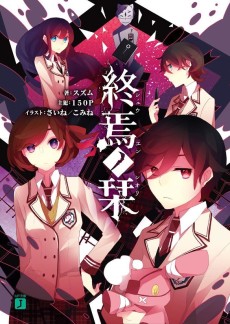 NOVEL HorrorShuuen no Shiori
NOVEL HorrorShuuen no Shiori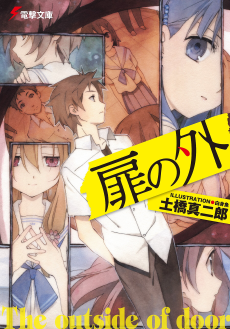 NOVEL DramaTobira no Soto
NOVEL DramaTobira no Soto
SCORE
- (4.3/5)
MORE INFO
Ended inSeptember 25, 2019
Favorited by 3,671 Users


